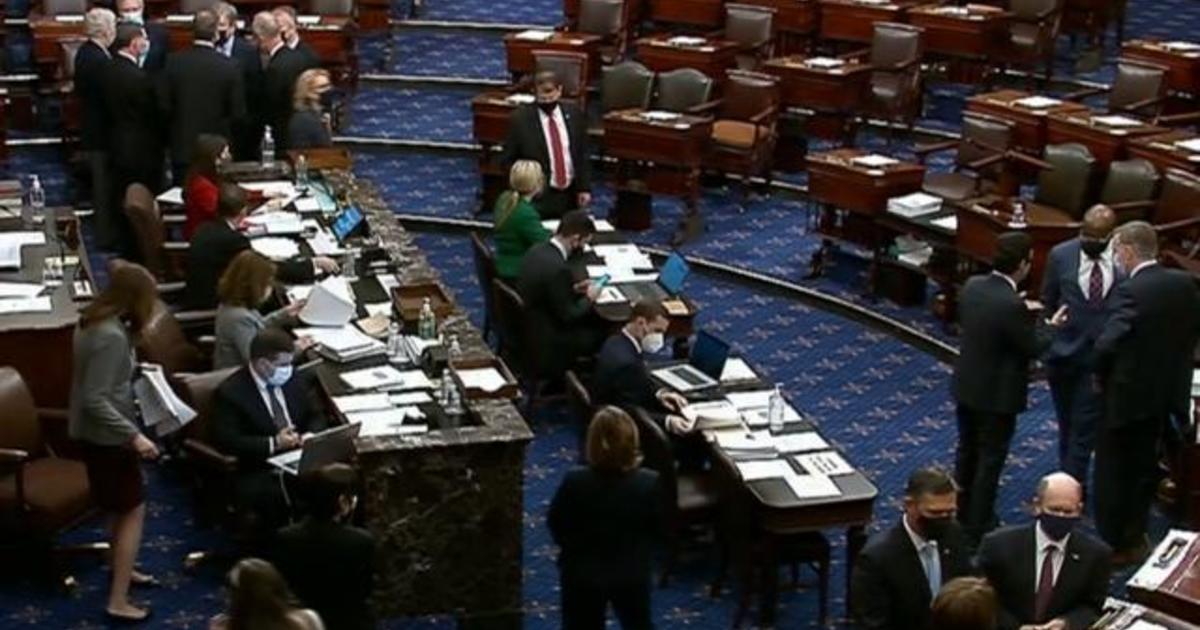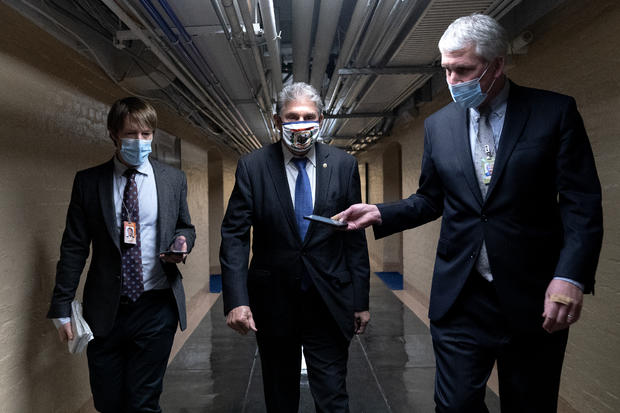Washington – The Senate approved President Biden $ 1.9 trillion coronavirus relief package Saturday, more than 24 hours after the debate on the bill opened. A strenuous amendment process, known as “vote-a-rama”, was paralyzed for nearly 12 hours on Friday due to disagreements within the Democratic caucus over an unemployment insurance benefit.
The final vote was 50-49, with all Democrats voting in favor of the bill and all Republicans voting against. The bill’s approval was met with cheers and applause from the Democrats, celebrating the approval of one of Biden’s top priorities. Vice President Kamala Harris did not have to visit the Capitol to break ties, as Republican Sen. Dan Sullivan left due to a family emergency on Friday.
Democrats took a victory lap after the bill was passed, with Senate majority leader Chuck Schumer telling reporters after the vote that “it’s a great day for this country”. The chairman of the Senate Budget Committee, Bernie Sanders, called the bill “the most significant piece of legislation to benefit working families in the modern history of this country”.
President Biden called the plan “historic” during a speech on Saturday.
“For more than a year, the American people were told they were alone,” he said, and later added, “This nation has suffered a lot for a long time, and everything in this package is designed to alleviate suffering and meet the most pressing needs. urgent needs of the nation. “
The president noted that 85% of American families will soon receive direct payments of $ 1,400 per person, and a “typical middle-class family of four” will receive $ 5,600. “It means that the mortgage can be paid. It means maintaining the health insurance you have. It will make a big difference in many lives in this country,” he said.
Senator Debbie Stabenow said that passing the bill was an exciting time for Democrats.
“People on the floor, in our caucus, it was almost like tears in their eyes. I mean, I felt it,” said Stabenow.
The House will vote on the amended legislation on Tuesday, after the House passed a slightly different version of the bill last week. If approved by the Chamber, it will then go to Mr. Biden’s desk for his signature. Schumer expressed confidence that the version of the Senate bill would pass the House.
“They think we have it, we have to do it,” he said.
Economic relief legislation is widely popular, with recent research showing that most Americans support it, especially the provision it provides. $ 1,400 in direct checks for those who earn less than $ 75,000. Senate Democrats have reached an agreement to limit eligibility for those who receive direct checks earlier this week. Other provisions of the bill include an additional $ 300 per week unemployment insurance until September 6, a child allowance of up to $ 3,600 per family, $ 350 billion in aid to state and local governments, and $ 14 billions for vaccine distribution.
Biden thanked the American people for their “overwhelming bipartisan support” for the package, without which “it would not have happened,” he said.
The final vote came after an arduous “vote-a-rama”, in which the Senate debated, considered and voted 39 amendments over a 25-hour period. The lawsuit was initially delayed by a standoff involving Sen. Joe Manchin, a moderate from West Virginia who became a critical player in the equally divided Senate.
On Friday night, Senate Democrats reached an agreement accepted by Manchin after he had an extended meeting with Schumer. The pledge amendment extended the additional unemployment insurance benefits until September 6, makes the first $ 10,200 non-taxable unemployment insurance benefits for families with an income below $ 150,000, and extends tax rules regarding limitations excess business loss by 2026.
The compromise amendment was approved by a vote of 50 to 49 just after 1 am. It was almost identical to a proposed change under an agreement reached on Friday morning by progressives and moderates, with the only change being the income limit for non-taxable benefits.
Biden emphasized during his speech on Saturday that the agreement extended assistance to the 11 million Americans who lost their jobs due to the pandemic – and whose benefits are “about to expire,” he said.
Manchin took a powerful role in the caucus because he is one of the decisive votes in an evenly divided Senate. Democrats have 50 seats, which means that there is no room for disagreement in the ranks: losing the support of a single senator means losing the general vote. Early Friday, Manchin seemed inclined to support an amendment introduced by Republican Sen. Rob Portman that would have cut unemployment benefit from $ 400 to $ 300 and extended until June.
Bloomberg / Contributor
The vote-a-rama initially started on Friday morning with a failed vote on an amendment proposed by Senator Bernie Sanders that would have raised the federal minimum wage. But the vote remained open even after all the senators voted, preventing the next amendment from being considered and allowing Democrats to work behind the scenes to convince Manchin to support his unemployment insurance amendment.
After almost 12 hours, the vote on Sanders’ amendment ended just before 11 pm, making it the longest vote in modern Senate history. “Vote-a-rama” then resumed shortly before midnight with a vote on Portman’s unemployment benefit amendment, which was passed by a 50-49 vote, with Manchin’s support. However, that amendment will be canceled by the Democratic amendment, which was voted a few hours later and which Manchin also supported. This compromise amendment will be included in the final bill.
Manchin acknowledged to reporters after the final vote on the bill on Saturday afternoon that the negotiations “took longer than they should have”, but expressed contentment with the final bill.
“We did that and we did a better deal,” said Manchin.
The Senate met on Friday morning with two hours of debate, followed by a vote on Sanders’ amendment, which would increase the non-included minimum wage to $ 15 an hour by 2025, and the minimum wage included to $ 14.75 in seven years. The Senate parliamentarian ruled last week that the Senate could not include a provision raising the minimum wage to $ 15 under budget reconciliation rules, then Republican Senator Lindsey Graham raised a point of order challenging the amendment.
Manchin, as well as Democratic Senators Jon Tester, Jeanne Shaheen, Kyrsten Sinema, Chris Coons, Tom Carper and Maggie Hassan, joined Republicans in voting against including the clause. Senator Angus King, an independent who joins the Democrats, also voted against adding the minimum wage increase to the bill. Manchin and Sinema, in particular, had previously expressed their opposition to raising the minimum wage to $ 15.
Congress is using the budgetary reconciliation process to approve the bill, which limits the time for debate and allows legislation to be passed by a simple majority, a solution that avoids the 60 vote limit that most bills require to move forward. Senate. If all Democrats supported the final bill, it would pass without any Republican support.
But Republicans are critical of the size of the bill and frustrated that Democrats are using the reconciliation process, arguing that they are taking a party route instead of working in parallel. Democrats respond that they don’t have to waste time negotiating with Republicans to reach the 60-vote limit and approve a smaller package.
In retaliation, Republican senators intended to make the amendment process politically painful for Democrats, with mixed results. One such vote could be about an amendment to prevent undocumented immigrants from receiving stimulus checks. During the “vote-a-rama” last month on the budget resolution to establish the reconciliation process, eight Democrats joined all Republicans in voting on the amendment, infuriating progressives. However, when the Senate voted on the amendment on Saturday morning, it failed without any Democratic support.
The Senate passed two amendments by verbal vote, one on the education of veterans and the other on aid to homeless children. The latest amendment was proposed by Republican Senator Lisa Murkowski and Manchin, and will devote $ 800 billion in education funds specifically to homeless children. The final amendment considered during the “vote-a-rama” was a bipartisan amendment sponsored by Republican Senator Marco Rubio and Democratic Senator Mark Warner, extending protections to federal contractors until September 30.
The Senate version of the bill differs from the House bill in several ways, including the amendments that were passed on Friday and Saturday. Some measures recently added, according to a Democratic Senate aide, include $ 510 million for FEMA and $ 750 million for states and communities affected by job losses and revenue in the tourism, travel and outdoor recreation sectors. Another provision separates funds for education, including $ 1.25 billion for evidence-based summer enrichment, $ 1.25 billion for after-school programs and $ 3 billion for educational technology. This would also make relief from the COVID-19 student loan tax-free.
A vote on the motion to continue the legislation debate was successful in a party vote on Thursday afternoon, with Harris breaking the 50-50 tie. Although budget reconciliation rules allow up to 20 hours of debate before “vote-a-rama”, Republicans and Democrats used only two, after Republican Senator Ron Johnson forced the Senate Secretary to read the entire bill out loud on Thursday night. The process lasted almost 11 hours, ending at dawn on Friday. The Senate agreed to meet late Friday morning for up to three hours of debate, but any time saved by limiting debate time was quickly wasted with the nearly 12-hour delay on the unemployment insurance amendment.
“The bottom line is this: this plan puts us on the path to fighting this virus,” said Biden on Saturday. “This plan gives the families that struggle the most the help and the breath they need to overcome this moment. This plan gives small businesses in this country an opportunity to fight for survival. And one more thing, ”he added,“ this plan is historic. “
Jack Turman and Audrey McNamara contributed reporting.

